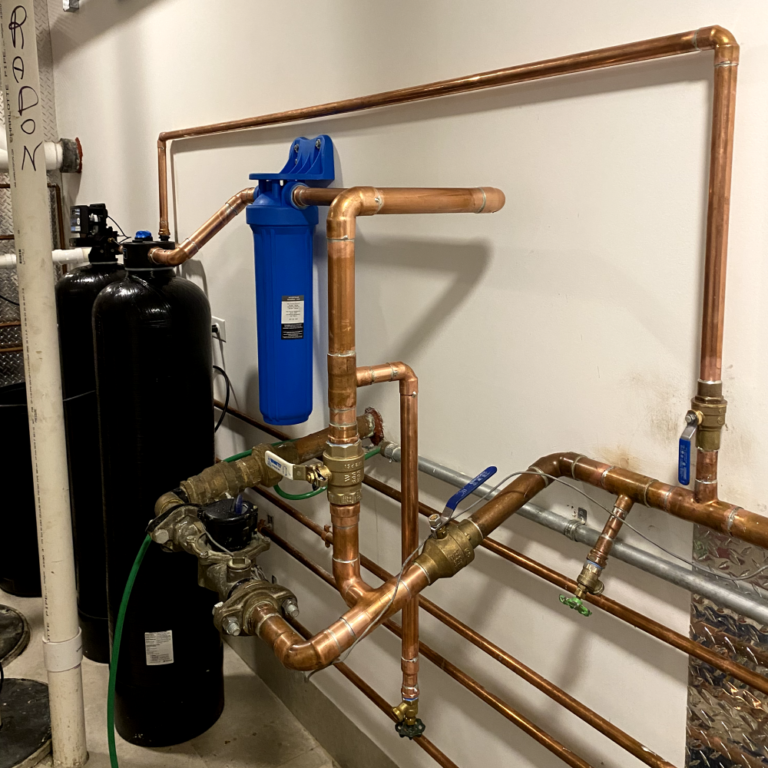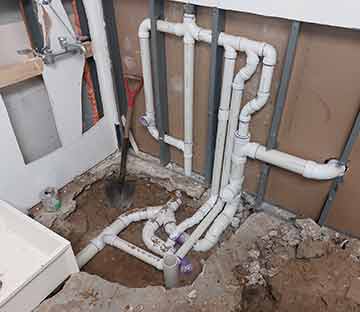Houston Repipe projects finished with care
Why Spending in Repiping Solutions Is Crucial for Your Home's Pipes Health and wellness
Repiping solutions play an important function in preserving a home's plumbing wellness. Gradually, pipes can corrode, leakage, or come to be stopped up, resulting in possible dangers and ineffectiveness. House owners typically neglect the indicators of weakening plumbing, which can cause significant damages. Comprehending the need for repiping is essential. What aspects should homeowners think about prior to making this financial investment? The answers might stun you.
Comprehending the Significance of Repiping
While many homeowners may overlook the value of repiping, it plays an important role in keeping the general health and wellness of a pipes system. Gradually, pipes can rust, create leaks, or become clogged with mineral down payments, leading to lowered water quality and flow pressure. Repiping addresses these issues by replacing old, broken pipes with new, resilient materials, making sure a reputable water supply and minimizing the danger of pricey fixings related to leakages and water damage. In addition, modern-day piping products are commonly a lot more effective and environmentally friendly, contributing to reduced power costs and enhanced water preservation. Conducting a repiping task can boost a home's resale value, making it a prudent investment for homeowners. Ultimately, acknowledging the value of repiping permits house owners to take positive steps in protecting their pipes systems and making certain a safe, useful living setting for their families.
Usual Indicators That Suggest the Requirement for Repiping
House owners ought to be cautious for certain indications that indicate the need for repiping, as ignoring these issues can bring about much more severe plumbing troubles. One usual indication is the presence of constant leaks, which can recommend aging or deteriorating pipelines. Additionally, an obvious drop in water stress might indicate blockages or rust within the plumbing system. Property owners might also see blemished or rusty water, signaling pipe destruction. Inexplicable water costs that are significantly greater than typical can additionally mean leakages hidden within the walls. Additionally, the growth of mold and mildew or mold in locations near plumbing fixtures can recommend wetness concerns coming from damaged pipes. If the home has old galvanized piping, it may be time to think regarding repiping, as this material is susceptible to corrosion and rust. Recognizing these indications early can help preserve a healthy plumbing system.
The Threats of Disregarding Pipes Issues
Ignoring plumbing problems can lead to considerable water damage, which might jeopardize the structural honesty of a home. In addition, unresolved leaks can develop an environment conducive to mold and mildew development, posturing severe wellness hazards to owners. Dealing with pipes issues quickly is important to guard both building and wellness.
Water Damage Concerns
When pipes issues go unaddressed, the risk of water damages escalates substantially. Leaks, leaks, and cracks in pipes can cause significant water breach, compromising the structural honesty of a home. With time, even minor leakages can cause rot, mold and mildew growth, and damage to walls and flooring, resulting in costly repair work. Water damages can likewise impact electrical systems, producing unsafe problems. House owners commonly ignore the cumulative influence of small leaks, which can result in prevalent damages otherwise quickly resolved. Ignoring plumbing issues not only increases the probability of immediate damage but can likewise decrease residential property value and present long-lasting monetary concerns. Consequently, prompt repiping services are vital to protect against water damage and keep a healthy home setting.
Health Hazards Increase
Unresolved plumbing concerns can result in significant wellness risks within a home. Contaminated water from rusty pipes can lead and introduce unsafe bacteria to severe ailments. Mold growth, frequently an outcome of leaks and excess dampness, poses breathing risks and can activate allergies. Furthermore, stagnant water can attract pests such as rodents and pests, which bring conditions that further threaten household wellness. Disregarding these plumbing troubles not only endangers the safety and security of citizens but can also lessen residential or commercial property value. Addressing pipes issues through repiping solutions is essential. Prompt treatment not only safeguards health but additionally assures a secure living atmosphere, avoiding a lot more substantial damage and costly repair services down the line.
Various Sorts Of Piping Materials
Piping materials are an essential element in pipes systems, influencing longevity, effectiveness, and total efficiency. Different options are readily available, each with one-of-a-kind properties and applications. Copper piping is understood for its durability and resistance to corrosion, making it a popular selection for both chilly and warm water lines. PVC (polyvinyl chloride) is light-weight, cost-efficient, and immune to chemical damage, primarily made use of for drainpipe and vent systems. PEX (cross-linked polyethylene) has gotten appeal due to its versatility and convenience of installment, enabling fewer joints and potential leak factors. Galvanized steel, though when typical, is less positive today due to from this source its vulnerability to corrosion and reduced water flow with time. Each material offers distinct benefits and drawbacks, making it crucial for house owners to talk to pipes professionals to figure out the most ideal choice for their particular demands and conditions. Choosing the right piping product can substantially affect the performance and safety of a pipes system.
The Repiping Process: What to Expect
The repiping procedure begins with a detailed assessment of the existing pipes to recognize issues and establish the very best strategy. Following this analysis, home owners will certainly require to select appropriate replacement products that match their plumbing needs. Ultimately, an overview of the installment process will supply understandings right into what to anticipate during this considerable home enhancement.
Assessment of Existing Pipelines
A precise assessment of existing pipelines is essential for making certain the long-term health and wellness of a pipes system. This assessment entails checking the products, age, and problem of the pipelines, in addition to identifying any indications of deterioration, leaks, or clogs - Houston Repiping Experts. Expert plumbing technicians frequently use advanced strategies such as video examinations to gain a clear view of the residential plumbing repair pipe's interior without invasive procedures. By determining trouble areas early, property owners can prevent more damages and costly repair work in the future. Furthermore, recognizing the existing state of the pipes infrastructure aids in making educated decisions concerning necessary upgrades or repiping. Generally, a detailed assessment functions as the foundation for a successful repiping process, guaranteeing that the brand-new system fulfills the home's specific requirements
Selecting Replacement Products
After reviewing the existing pipelines, property owners encounter the important decision of choosing ideal substitute materials for their plumbing system. Common options include copper, PVC, PEX, and CPVC, each with unique benefits and under sink plumbing disadvantages. Copper is recognized for its toughness and resistance to rust, making it a lasting selection. PVC is cost-efficient and lightweight, ideal for drain and air vent lines. PEX offers versatility and is immune to range and chlorine, making installment simpler in tight areas. CPVC resembles PVC yet can withstand greater temperatures. Home owners should take into consideration variables such as budget, neighborhood building regulations, and the specific demands of their pipes system when making this decision, guaranteeing ideal performance and longevity for their home's plumbing framework.
Setup Process Summary
Repiping a home can be a considerable undertaking, but understanding the setup process helps homeowners prepare for what exists ahead. The process typically begins with a detailed inspection of the existing plumbing system to determine problem locations. Next, a detailed plan is formulated, describing the needed materials and timelines. On the installment day, specialists will often start by closing off the water and draining pipes the existing pipes. They then remove the old piping, which may include opening walls or ceilings for accessibility. Brand-new pipelines are installed, guaranteeing they satisfy existing plumbing codes. The system is evaluated for leakages, and any type of openings are fixed. Property owners can expect a clean and effective process, lessening disturbance to their every day lives.
Long-Term Advantages of Repiping Your Home
While many property owners may neglect the relevance of updating their plumbing, the lasting benefits of repiping a home can significantly enhance both its value and functionality. Among the main benefits is boosted water top quality. Older pipes might harbor contaminants and corrosion, while brand-new piping warranties tidy and risk-free water distribution. In addition, repiping can result in enhanced water stress, making everyday tasks more effective.

How to Choose the Right Pipes Service for Repiping
Just how can house owners guarantee they pick the finest pipes solution for repiping? First, they must investigate neighborhood pipes firms, concentrating on those that concentrate on repiping solutions. Reading on the internet testimonials and testimonies can offer understandings into the top quality of service used. It's necessary to look for suitable licensing and insurance, making sure the picked company follow local policies
Property owners should likewise request detailed quotes from several service providers to compare prices and solutions provided. Involving straight with potential plumbings can aid evaluate their knowledge, interaction skills, and determination to respond to concerns. Furthermore, requesting recommendations from previous clients can confirm a company's integrity and handiwork.
Lastly, house owners must take into consideration the business's guarantee plans on products and labor, as this can show their commitment to high quality. By following these guidelines, house owners can make an enlightened choice, protecting their plumbing health and wellness via efficient repiping solutions.
Often Asked Inquiries
How much time Does a Typical Repiping Job Take to Total?
A normal repiping project typically takes in between one to five days to finish, relying on the size of the home and intricacy of the pipes system. Proper planning and professional proficiency can influence total duration substantially.
Will Repiping Rise My Home's Resale Value?
Repiping frequently improves a home's resale value, as prospective customers value upgraded pipes systems. This improvement reduces prospective plumbing issues, making the residential property extra appealing and possibly justifying a higher asking cost throughout sale settlements.
Can I Remain In My Home Throughout Repiping?
Throughout repiping, remaining in the home is often possible, but it may rely on the degree of the work. Home owners must prepare for momentary disruptions and talk to specialists for details plans and security factors to consider.
What Is the Average Expense of Repiping a Home?
The average price of repiping a home typically ranges from $4,000 to $15,000, relying on factors such as the dimension of the house, products made use of, and labor prices linked with the plumbing work. - Houston Repiping Experts
Do I Need a Permit for Repiping Providers?
A license is commonly needed for repiping solutions, as it ensures conformity with neighborhood building regulations and laws. Home owners must consult their local authority or an accredited plumber to figure out details permitting needs for their location.
